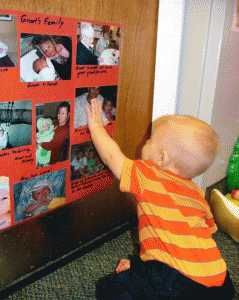In order to provide quality, meaningful resources, services, and professional development, the Devereux Center for Resilient Children has remained true to these six underlying principles that guide all of the work we do:
- Promote the strengths, happiness and resilience of all children. DCRC recognizes that all children, no matter their current risk status need a strong social and emotional foundation.
- Support the well-being of the adults who parent, nurture and educate children. Young children’s healthy social and emotional development is dependent on the health and well-being of the adults who care for them.
- Provide strength-based approaches. Research confirms that promoting children’s social and emotional strengths reduces the development and escalation of behavioral concerns.
- Build strong partnerships between parents and child-serving professionals. DCRC recognizes that parents and caregivers with consistent, nurturing, developmentally appropriate expectations of children are critical to their social and emotional health.
- Encourage collaboration to optimize positive outcomes. All adults in the life of a child working together to provide consistent, positive care to young children is tremendously beneficial to promoting within-child protective factors.
- Foster data-driven decision making. Decisions about how to optimize a child’s social and emotional health must be based on reliable and valid information. The DCRC approach uses data to inform decisions and also to track progress.

All of the Initiatives that fall under the DCRC umbrella are based on resilience theory and emphasize the importance of strength-based assessment and planning to foster healthy social and emotional development. In efforts to best meet the needs of professionals serving children at different ages and in different settings, several Initiatives are in place including: DCRC’s Infant and Toddler Initiative, Preschool Initiative, School-Age Initiative, Adult Resilience Initiative and Child Welfare Initiative.
Infant & Toddler Initiative

DCRC’s Infant and Toddler Initiative focuses on promoting the healthy social and emotional development of infants (ages 4 weeks through 18 months) and toddlers (ages 18 – 36 months). At the core of the approach to promote resilience in infants and toddlers is the use of nationally standardized, strength- based measures of within-child protective factors. The Devereux Early Childhood Assessment for Infants and Toddlers may be completed by both parents and caregivers and provides reliable and valid data to promote young children’s social and emotional development. Strategy resources for professionals and families are designed to ensure that screening and assessment data is incorporated into planning efforts for the home and care settings that strengthen children’s protective factors. All of the resources support adults in understanding the following:
- Why a focus on infant/toddler resilience is so critical at this young age
- How to collect information that informs strategy implementation to optimize a child’s social and emotional development
- How all adults working with the child and family can collaborate to work effectively as a team
- How to continually evaluate the status of resilience building efforts to ensure that the desired outcomes are achieved.
DCRC’s Infant and Toddler Initiative focuses on supporting professionals and communities in creating effective resilience-building systems. DCRC Infant and Toddler specialists offer a variety of training and technical assistance options to early childhood programs, Part C providers, Early Childhood Mental Health Consultants and other professionals and programs serving infants and toddlers. All professional development and technical assistance options are adapted to best meet the unique needs of the particular programs and communities.
Preschool Initiative

DCRC’s Preschool Initiative focuses on promoting the healthy social and emotional development of young children ages 3 through 5 years old. The centerpiece of the approach to promote resilience in preschoolers is the use of a nationally standardized, strength-based measure of within-child protective factors. The Devereux Early Childhood Assessment for Preschoolers may be completed by both parents and caregivers and provides reliable and valid data to promote young children’s social and emotional development.
Strategy resources for professionals and families are designed to ensure that screening and assessment data is incorporated into planning efforts for the home and care settings that strengthen children’s protective factors. All of the resources support adults in understanding the following:
- Why a focus on fostering resilience is so critical at this age
- How to collect information that will inform strategy implementation to optimize a child’s social and emotional development
- How all adults working with the child and family can collaborate to work effectively as a team
- How to continually evaluate the status of resilience building efforts to ensure that the desired outcomes are being achieved
DCRC’s Preschool Initiative focuses on supporting professionals and communities in creating effective resilience building systems. While most commonly implemented within early care and education settings, community mental health initiatives and school readiness programs have also successfully incorporated the resources into their overall program design. DCRC Preschool specialists offer a variety of training and technical assistance options that help ensure that effective implementation is supported and individualized to meet the unique needs of specific programs and communities.
School-Age Initiative

DCRC’s School-age Initiative focuses on promoting the social-emotional competence of children from Kindergarten through 8th grade. Central to the School-age Initiative are two innovative ratings scales designed to screen, assess, guide intervention planning, monitor progress, and evaluate outcomes related to social-emotional competence and resilience. Designed for parents, teachers and after-school program staff to complete, the Devereux Student Strengths Assessment (DESSA) and the DESSA-mini provide a comprehensive, integrated approach to support children’s healthy social-emotional development.
The DESSA Comprehensive System is a two-part system. First, the DESSA- mini is used as a universal screener to evaluate all children. For those children who are identified as at risk for social-emotional difficulties, the DESSA is administered. As a thorough assessment of social-emotional competencies, the DESSA provides a variety of tools to chart and communicate results, monitor progress, and evaluate outcomes.
DCRC’s school-age team offers training and consultation to support schools and after-school programs understand how to most effectively implement the DESSA Comprehensive System.
Adult Resilience Initiative

DCRC’s Adult Resilience Initiative focuses on promoting the health and well- being of all adults who parent, nurture and/or work with young children. The critical connection between children’s resilience and the health and wellness of the adults in children’s lives can not be underestimated. DCRC’s Adult Resilience Initiative emerged in response to the growing understanding and appreciation that promoting children’s resilience depends significantly on the resilience of the adults caring for them.
The Devereux Adult Resilience Survey (DARS) is a 23 item reflective checklist that provides adults with information about their personal strengths. Information from the DARS can be used to help adults build on their identified strengths so that they are better able to cope with stress and the challenges of caring for young children. Statistical analyses show that the DARS is an excellent tool for adults and provides valuable insights, particularly in these four areas: Relationships, Internal Beliefs, Initiative and Self-control.
The DARS is incorporated into Building Your Bounce: Simple Strategies for a Resilient You, an Adult Resilience Journal. The ideas in this resource are simple and straightforward and, they can make a very positive impact on caregivers’ lives. The overwhelmingly positive reception for Building Your Bounce has provided the DCRC team with a stronger appreciation for the need to focus on adult resilience, resulting in the creation of several professional development events on this important topic. An effort to reach professionals with this important information through keynote addresses, training and technicalassistance sessions and web-based information sharing has become and will remain a strategic focus for DCRC.


